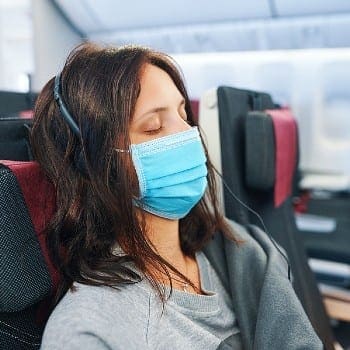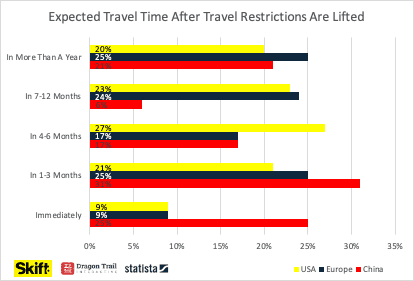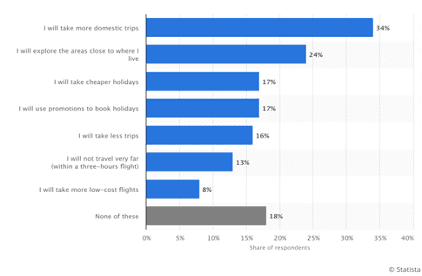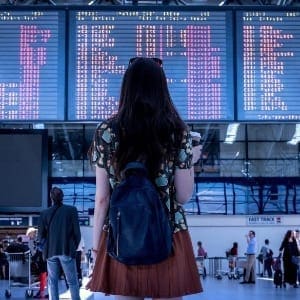
For the last few months, it feels like humanity has been stranded amidst an unpredictable and unprecedented storm. Everywhere across the globe, people have experienced the COVID-19 tsunami hit. And even though the waves’ impact was not the same for everyone, it was big enough to wash away a lot of our old ways of living. While for some the tempest is still raging on, others are starting to see what the world of tomorrow looks like. However, the journey to recovery has been harrowing and left lasting scars on a whole generation (which some are quick to name the COVID Generation). These wounds will, in turn, become part of the collective consciousness and change the way each of us interacts with the world for the foreseeable future.
At this point, as hospitality professionals, we may ask ourselves: what do these changes imply for the travel industry? Once a source of carefree leisure, often a synonym for relaxation, could travelling have lost some of its key defining features during the crisis? Or, on the contrary, could we see a sudden resurgence of the sector, with travelers seeking revenge on their lengthy lockdown? Let us try to answer these questions and more by diving into the psychological impacts of COVID-19 on travel.
In this article, we will analyze how the COVID-19 outbreak reshaped the way people perceive travel and what it means for the hospitality industry at large. First, we will focus on raw data by analyzing initial reactions from around the world regarding future travel habits. Then, we will consider some of the most commonly accepted scenarios for the post-COVID-19 travel market. Once we established accurate representations of these global mindsets post-pandemic, we will explore reflection paths on which one is most representative of the future COVID generation.
Before starting our analysis, we just want to acknowledge that, even though these article’s conclusions are based on verified data, they still are the results of hypothesizes and opinions which, given the current situation of the crisis, are not to be taken as accurate predictions of the future.
A glimpse of the future
In many countries, lockdown measures have put an abrupt stop to travel. And even though there have been some signs of relief in western Europe and China, travel bans and quarantine procedures are still weighing heavily on the hospitality industry. Without certain knowledge of when the pandemic will end, we will focus on data covering people’s expected outlook on travelling in a post-COVID-19 world.
In doing so, we decided to regroup data from different parts of the world, namely China, the US and Europe to see if one particular reaction found echo across the globe. After going through the numbers, most surveys tend to indicate that most of the world will be travelling again, although a bit less and very differently than pre-COVID. Out of these three parts of the world, China seems to hold a bit more of an optimistic outlook on the future, being the first country to be hit, as well as the first on the road towards recovery.
 According to these stats, the pandemic shock was brutal enough to dissuade most people to grab their suitcases and travel right in the weeks after travel restrictions have been lifted. This makes sense as holiday planning will likely take more time than pre-COVID. Between making sure that the destination country is safe and finding the right transportation/accommodation in a highly disturbed hospitality industry, travelers might find it more difficult to organize their trips.
According to these stats, the pandemic shock was brutal enough to dissuade most people to grab their suitcases and travel right in the weeks after travel restrictions have been lifted. This makes sense as holiday planning will likely take more time than pre-COVID. Between making sure that the destination country is safe and finding the right transportation/accommodation in a highly disturbed hospitality industry, travelers might find it more difficult to organize their trips.
However, one of the key takeaways here is that about 75% of people will travel again in the year following the end of COVID-19 restrictions. At first sight, the inclination to keep on exploring the world seems to outweigh the fear of a virus rebound. Although, the way people approach traveling might look very different in the coming years.
 When asked how they would change their travel habits post-pandemic, most respondents answered that they will try to take trips to areas closer to their home. This feeling is echoed across the globe as border controls worldwide are becoming stronger and stronger. This shift from international to domestic is nothing new as it capitalizes on the responsible travel trends which emerged a few years back (less CO2 emissions, local communities support …). And all signs seem to indicate that the COVID-19 outbreak will propel this change to the next level.
When asked how they would change their travel habits post-pandemic, most respondents answered that they will try to take trips to areas closer to their home. This feeling is echoed across the globe as border controls worldwide are becoming stronger and stronger. This shift from international to domestic is nothing new as it capitalizes on the responsible travel trends which emerged a few years back (less CO2 emissions, local communities support …). And all signs seem to indicate that the COVID-19 outbreak will propel this change to the next level.
Indeed, domestic travel also ticks another very important box: affordable cost. As the graph suggests, the pandemic had a negative impact on most people’s financial resources. As a result, travelers are likely to want to cut down on their trip-related budgets. Hence, being able to minimize travel expenses has become a very important factor and one of the reasons why local tourism has had the wind in its sails.
Although one might be tented to rely solely on such data to anticipate travelers’ mindset in a post-COVID-19 world, this approach only covers the tip of the iceberg. In order to fully comprehend the extent of the pandemic’s impact on the travel industry, we need to part ways with individuals’ vague outlooks on the future and take a look at the bigger picture. In the next lines, we will try to identify global trends travel resultant of the COVID-19 outbreak.

Revenge Travel: hit or myth?
Emerging from the revenge shopping streak that happened in China post lockdown[1], hospitality experts have predicted a similar phenomenon happening in the travel industry. As the term suggests, “revenge travel” defines the urge for some people to compensate for the time lost during lockdown by increasing the frequency at which they take trips as soon as they are allowed to. And, in fact, such a travel surge has been observed in the years following the 2008 financial crisis: while carbon emission generated by air travel dropped by 5% in the year following the crisis, it increased drastically by more than 10% in 2010. At first sight, this seems to indicate that we are due for a comparable outcome in the post-COVID-19 world.
And, if you think about it logically, the revenge travel hypothesis makes perfect sense. Indeed, most people had to endure a lengthy lockdown and, in many cases, had to cancel holiday plans because of the pandemic and travel restrictions. In a regular environment, one would think that the next logical step would be to start planning the next trip. But once again, as we saw notably in the statistics, the COVID-19 situation seems to set itself apart.
To some extent, revenge travel might happen but in no way will it reach the same heights as back in 2010. Although the most adventurous among us will probably hop on a plane as soon as they can, the vast majority of travelers will think twice before booking their next trip. While revenge travel did happen in the year following the 2008 crisis, the difference in both context and consequences with our current situation is considerable. In the case of the 2008 financial crisis, the biggest impact was directed to our travel means, i.e. money. The COVID-19 outbreak added a whole new layer to this dire situation; in addition to worsening most people’s financial condition, it fundamentally transformed both the way we want to travel (habits change) and the way we can (new safety regulations) travel.
Such a change is bound to have drastic, lasting effects on the hospitality industry and will likely trigger a global shift in paradigms. This is why we believe that revenge travel will be nothing more than a bump in the revolution the hospitality industry will have to undergo. In this next and final section, we will analyze what this revolution will look like.
Understanding the COVID generation
The hospitality industry is familiar with the ever-changing nature of travelers’ behavior. From Millennials to Baby boomer, to Gen Z, hospitality professionals have been learning throughout the years how to cater to these different types of travelers. But in our case, the shift will be swift and global and there will be little time to adapt to these changes. However, it would be wrong to say that transformation will be coming right out of the blue. In fact, most of the characteristics we will attribute to the COVID generation build upon past trends and exacerbate them. More often than not, the pandemic was only the trigger for a more widespread acceptance of these new habits, or the virus that broke the camel’s back.
One point we discussed earlier and that will be key in the way the COVID generation approaches travel is the advent of local trips. The reasoning behind this trend is quite straight forward: why go all the way across the globe to spend your vacation while you can enjoy the same level of comfort in your own country? Doing so you reduce your carbon footprint, support your local community/economy while avoiding some of the hassle that comes with traveling abroad (currency, language, …). While all of these advantages were true pre-COVID, the pandemic added some more key benefits to domestic travel; the most critical of which is the safety net traveling inside your country’s borders implies. Without a proper vaccine, there is no guarantee that there won’t be a new wave of the virus and being stuck in a foreign country is the last thing you would want to happen in such a case. In addition to this, there is also the financial aspect which, while it may be only temporary, still weighs in favor of domestic travel.
Another attribute that has been further emphasized by the COVID-19 outbreak is the need for more communication and personalization. Now more than ever, travelers need to know that hotels have understood their needs, particularly safety-wise. In order to demonstrate that, building an effective communication strategy is key. The customer loyalty program is also especially important as travelers are more likely to come back to hotels they know and trust. Moreover, heightened personalization at every step of the guest journey can also contribute to building this critical feeling of confidence.
Digital has also become more essential than ever before. As a natural response to lockdowns and social distancing, more people have been moving away from physical meetings to book their holidays (travel agents/paperback advertisements for example) to the internet. But, at the same time, the trust built between OTAs (Booking.com, Expedia, …) and their users were shattered by the poor handling of the COVID-19 crisis. Travelers are now looking more and more into alternative online booking solutions, most notably direct bookings.
In all of these attributes, we can see a common pattern: the feeling of safety when traveling is paramount and will stay this way for the foreseeable future.
As a hotelier, there is no simple way to face these changes. You might be among the lucky who felt that the wind was shifting and took action in consequence but, if not, you will likely not be able to maintain your pre-COVID-19 offers. This kind of once-in-a-lifetime situation only leaves you with two choices: adapt to the new world or give way to those who can[2].
[1] For example, during said revenge shopping, a Hermès store in China made 2.4 millions dollars on the first day it was allowed to reopen.
[2] More info on how to adapt: https://insights.ehotelier.com/insights/2020/04/22/the-darwinian-laws-of-a-post-covid19-hotel-market/






























